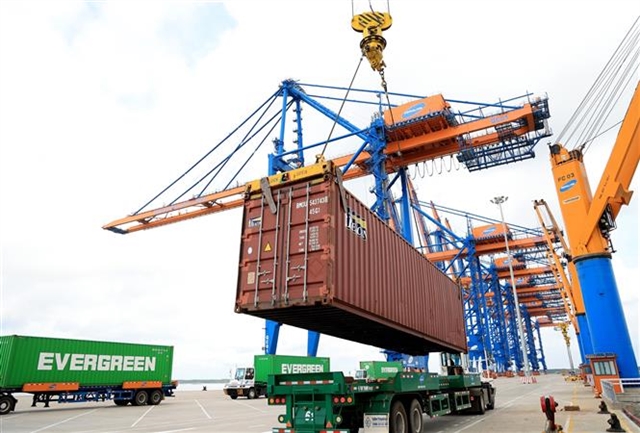 Economy
Economy


|
| Unloading containers in the Cái Mép port cluster, Bà Rịa-Vũng Tàu Province. — VNA/VNS Photo |
HÀ NỘI — With over 50 years of diplomatic relations and 14 years of strategic partnership, the economic, trade and investment cooperation between Việt Nam and the United Kingdom (UK) has laid a solid foundation for rapid growth.
Central to this progress is the Việt Nam - UK Free Trade Agreement (UKVFTA), officially effective since January 1, 2021, which has served as a vital bridge for fostering bilateral trade post-Brexit.
The UKVFTA has significantly enhanced trade relations, with Việt Nam’s exports to the UK soaring from US$4.94 billion in 2020, to over $6.34 billion in 2023.
Last year - a tough year for global supply chains including Việt Nam, commerce stood out in the country's economic growth, notably with increased trade between Việt Nam and the UK. The UKVFTA offers untapped benefits for Vietnamese exporters, while importers seek to capitalise on them.
In 2024, challenges loom for Việt Nam's exports, especially agricultural products, to the UK. Issues such as international port congestion, escalating transportation costs and container shortages are prevalent.
Additionally, dampened market demand in the UK, due to an economic downturn, high inflation and constrained consumer spending, has resulted in a continuous negative trend in the Consumer Confidence Index (CCI) for recent months in the UK.
A survey published last month showed that the GfK CCI, the longest-running measure of British consumer sentiment, rose to -18 in November, its highest since August and up from -21 in October, which was its lowest since March.
The UK is also a demanding market, with stringent quality standards and rising expectations for sustainability and green certifications.
As a result, strategic adjustments are required from Vietnamese businesses.
Companies must also prepare for the UK’s upcoming Carbon Border Adjustment Mechanism (CBAM), effective January 2027, which will target high-carbon products like steel and aluminum. Compliance with these requirements will necessitate technological upgrades and investment in greener practices.

|
| Workers making shoes for export at a plant. — VNA/VNS Photo |
Comprehensive market analysis
To fully harness the potential of the UKVFTA, Vietnamese businesses need to adopt UK standards in production and certification, especially for agricultural and processed goods. This requires active monitoring of regulatory updates and consumer trends in the UK market.
On the other hand, leveraging e-commerce platforms and digital marketing can enhance market penetration and consumer outreach. Online trade fairs and digital branding will further strengthen business-to-business connections.
Nguyễn Cảnh Cường, a former trade counselor at Vietnamese Embassy to the UK, highlights the growing dynamism of Vietnamese businesses, especially among young enterprises, equipped with new skills in digital technology and marketing on digital platforms. These advancements facilitate quicker and more extensive information retrieval compared to conventional methods.
Yet, not all businesses match the proficiency and success of those expanding into the UK market. Many companies lack proactive research and market information exploration, even overlooking fundamental data. Some Vietnamese enterprises boast quality products but struggle with market penetration strategies.
"Vietnamese businesses still face limitations in information search and analysis. Valuable free data on UK companies can be found on companieshouse.gov.uk," Cường told Vietnam Economic News.
He also shared his experience of Vietnamese companies engaged in decade-long partnerships which seemed promising but turned perilous when trust led to goods delivered upfront, payments deferred and partners teetering on the brink of insolvency.
Cường stressed the critical importance of scrutinising the financial health of partners, including those with traditional ties.
Similarly, Vũ Việt Thanh, head of the Department of European-American Market under the Ministry of Industry and Trade (MoIT), said that businesses needed to meticulously research and understand market information. It is crucial to tightly control the entire production process, ensure traceability and maintain food safety and quality standards.
Businesses should enhance the application of science and technology, develop deep processing and production systems, optimise production cycles to increase the competitiveness of goods.
In the future, Việt Nam and the UK will both be members of the Comprehensive and Progressive Agreement for Trans-Pacific Partnership (CPTPP), opening up new development opportunities, particularly in certain sectors, Thanh added.
Therefore, exporters must boost production and link all along the supply chains, from production to consumption and then export. Furthermore, they should research and seek development partners to attract investments from UK businesses into specific production lines, thereby leveraging the capital and technology of these partners.
Active engagement with trade promotion agencies, including Việt Nam’s trade mission in the UK, can help businesses navigate market complexities. These agencies provide critical insights, foster connections and advocate for favourable policies.
To align with the UK’s preference for eco-friendly products, Vietnamese companies should prioritise sustainable production and supply chain practices. Accessing financial support for green technology and certifications will be crucial.
Moreover, participation in trade exhibitions and networking events in the UK can uncover new opportunities for collaboration. Highlighting Việt Nam’s strengths in key industries will enhance visibility and competitiveness. — VNS




